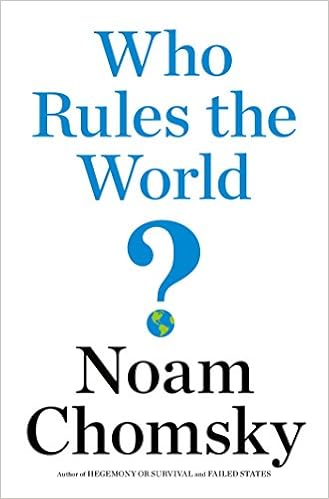by NOAM CHOMSKY
 IMAGE/Amazon
IMAGE/Amazon
When we ask “Who rules the world?” we commonly adopt the standard convention that the actors in world affairs are states, primarily the great powers, and we consider their decisions and the relations among them. That is not wrong. But we would do well to keep in mind that this level of abstraction can also be highly misleading.
States of course have complex internal structures, and the choices and decisions of the political leadership are heavily influenced by internal concentrations of power, while the general population is often marginalized. That is true even for the more democratic societies, and obviously for others. We cannot gain a realistic understanding of who rules the world while ignoring the “masters of mankind,” as Adam Smith called them: in his day, the merchants and manufacturers of England; in ours, multinational conglomerates, huge financial institutions, retail empires, and the like. Still following Smith, it is also wise to attend to the “vile maxim” to which the “masters of mankind” are dedicated: “All for ourselves and nothing for other people” — a doctrine known otherwise as bitter and incessant class war, often one-sided, much to the detriment of the people of the home country and the world.
In the contemporary global order, the institutions of the masters hold enormous power, not only in the international arena but also within their home states, on which they rely to protect their power and to provide economic support by a wide variety of means. When we consider the role of the masters of mankind, we turn to such state policy priorities of the moment as the Trans-Pacific Partnership, one of the investor-rights agreements mislabeled “free-trade agreements” in propaganda and commentary. They are negotiated in secret, apart from the hundreds of corporate lawyers and lobbyists writing the crucial details. The intention is to have them adopted in good Stalinist style with “fast track” procedures designed to block discussion and allow only the choice of yes or no (hence yes). The designers regularly do quite well, not surprisingly. People are incidental, with the consequences one might anticipate.
The Second Superpower
The neoliberal programs of the past generation have concentrated wealth and power in far fewer hands while undermining functioning democracy, but they have aroused opposition as well, most prominently in Latin America but also in the centers of global power. The European Union (EU), one of the more promising developments of the post-World War II period, has been tottering because of the harsh effect of the policies of austerity during recession, condemned even by the economists of the International Monetary Fund (if not the IMF’s political actors). Democracy has been undermined as decision making shifted to the Brussels bureaucracy, with the northern banks casting their shadow over their proceedings.
Mainstream parties have been rapidly losing members to left and to right. The executive director of the Paris-based research group EuropaNova attributes the general disenchantment to “a mood of angry impotence as the real power to shape events largely shifted from national political leaders [who, in principle at least, are subject to democratic politics] to the market, the institutions of the European Union and corporations,” quite in accord with neoliberal doctrine. Very similar processes are under way in the United States, for somewhat similar reasons, a matter of significance and concern not just for the country but, because of U.S. power, for the world.
The rising opposition to the neoliberal assault highlights another crucial aspect of the standard convention: it sets aside the public, which often fails to accept the approved role of “spectators” (rather than “participants”) assigned to it in liberal democratic theory. Such disobedience has always been of concern to the dominant classes. Just keeping to American history, George Washington regarded the common people who formed the militias that he was to command as “an exceedingly dirty and nasty people [evincing] an unaccountable kind of stupidity in the lower class of these people.”
In Violent Politics, his masterful review of insurgencies from “the American insurgency” to contemporary Afghanistan and Iraq, William Polk concludes that General Washington “was so anxious to sideline [the fighters he despised] that he came close to losing the Revolution.” Indeed, he “might have actually done so” had France not massively intervened and “saved the Revolution,” which until then had been won by guerrillas — whom we would now call “terrorists” — while Washington’s British-style army “was defeated time after time and almost lost the war.”
Counterpunch for more
